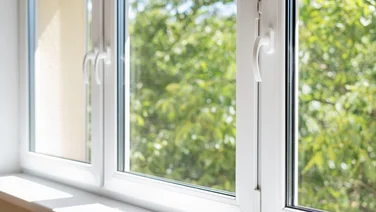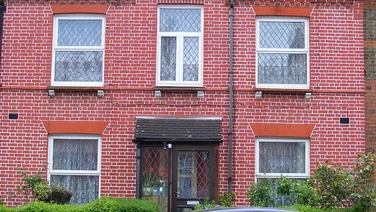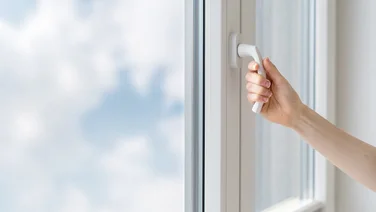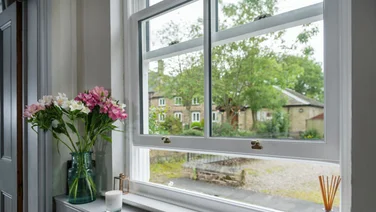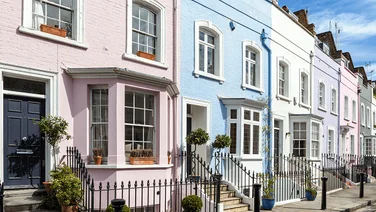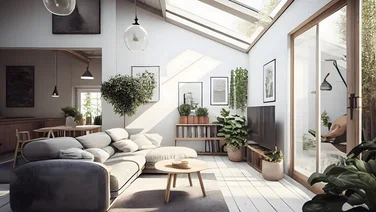We receive a small fee from trusted installers when you request a quote through our site. This helps us keep our content independent, well-researched and up to date – Learn more
- How much do double-glazed doors cost?
- Factors affecting the cost of double-glazed doors
- How to reduce the cost of double-glazed doors
- Pros and cons of double glazed doors
- Advantages of double-glazed doors
- Disadvantages of double-glazed doors
- Are there any government grants for double-glazed doors?
- How long does a double-glazed door installation take?
- Should you get uPVC doors?
- How much do uPVC doors cost?
- How much do door materials cost?
- What affects the cost of a uPVC door?
- Can I install a uPVC door myself?
- Pros and cons of uPVC doors
- What are bifold doors?
- How much do uPVC bi-fold doors cost?
- What affects the price of uPVC bifold doors?
- How much does it cost to install bifold doors?
- Can I get uPVC doors on finance?
- How do you find a bifold door installer?
- Summary
- Standard-sized double-glazed doors typically cost between £600 and £5,000+
- Bi-fold double-glazed doors cost more than other designs
- Double glazing can save you up to £140 per year on energy bills

The cost of double-glazed doors varies based on type, size, and frame material, with prices starting from £600. In this guide, we’ll break down the options, pros and cons, and help you get free quotes from trusted suppliers.
How much do double-glazed doors cost?
| Type of door | Average price range |
|---|---|
Front | £600 – £775 |
French | £950 – £1,175 |
Sliding patio | £450 – £1,800 |
Bifold | £5,000 + |
*Prices courtesy of CheckaTrade, May 2025.
As you can see from the table above, double-glazed door prices range from £600 to more than £5,000, depending on type, style, and size. Furthermore, the material used for the frame is another factor that will impact the price.
For example, when it comes to type, bi-fold doors cost more than any other style as they have a more complex design and thus require more time and resources to manufacture.
As for the frame, the main options are uPVC, composite, wood, and aluminium. uPVC is usually the most popular as well as the most affordable material. Aluminium tends to be the most expensive, but it’s more durable and the most aesthetically pleasing.
If you want to know how much new windows might set you back, look at our double glazing cost calculator.
Factors affecting the cost of double-glazed doors
In addition to door type and frame material, several other factors can influence the cost of double-glazed doors. Here are the most important ones to consider:
- Size: The cost of double-glazed doors vary on size. Expect to pay more for larger or custom-sized doors.
- Glass type: Glass options for double-glazed doors include annealed (float) glass, laminated glass, toughened glass, self-cleaning glass, acoustic glass, coated glass and low-emissivity glass. Each type has its advantages, drawbacks, and costs. You’ll pay more for enhanced glass types, like laminated or toughened glass, than basic types, like annealed (float) glass, due to the extra features in the former.
- Installation: Professional installation is recommended for double-glazed doors to ensure proper fitting and to prevent costly mistakes. Some suppliers include the cost of installation in their unit pricing.
How to reduce the cost of double-glazed doors
If the price of double-glazed doors is putting you off, you’ll be pleased to know that there are a few things you can do to cut back on costs. We’ve listed a few ways below to give you a head start:
- Compare prices: Getting quotes from multiple suppliers and comparing them will give you a good idea of what constitutes a reasonable price. It can also help you negotiate a lower price with your preferred supplier. Fortunately, we can assist you in speeding up this process with our quote tool. Don’t be afraid to ask for a discount from your dealer. Many are willing to offer one, especially if you’re purchasing multiple doors or if you combine the purchase with other products.
- Use a local supplier: Buying from local suppliers can be more cost-effective as it eliminates or reduces shipping or transportation costs.
- Opt for standard sizes: Opt for standard sizes over custom sizes. Custom sizes tend to have a higher price tag due to the additional manufacturing costs incurred.
- Choose materials wisely: Material options, such as aluminum window frames or wooden window frames, might offer better aesthetics, but they come with a higher price. If saving money is a priority, go for a more affordable option like uPVC.
- Consider partially-glazed doors: If budget constraints are a concern, consider partially glazed doors. Their costs run lower while still delivering some of the benefits of their fully glazed peers.
If you’re interested in financial help, including double-glazing grants for over-60s, have a look at our guide.
Pros and cons of double glazed doors
Before you invest in a set of double glazed doors, it’s always a good idea to weigh up the pros and cons. Thankfully, we’ve done the hard work for you.
- Energy cost savings
- Noise reduction
- Improved security
- Higher home resale value
- Require a higher financial investment initially
- Can trap heat in the summer
- Prone to condensation
- Not repairable in case of damage
Advantages of double-glazed doors
- Improved energy efficiency:
- Double-glazed doors help prevent heat transfer.
- Can improve your home’s energy performance rating.
- May reduce heating bills.
- Noise reduction:
- Dual layers of glass and insulating gas keep unwanted noise outside.
- Dual layers of glass and insulating gas keep unwanted noise outside.
- Enhanced security:
- More challenging to break than single-glazed doors.
- Offers better protection against intruders.
- Increased property value:
- Makes your home more appealing to prospective buyers.
- Can boost resale value by up to 10%.
Disadvantages of double-glazed doors
- Higher upfront cost:
- Double-glazed doors typically require a larger initial investment compared to other types of doors.
- Double-glazed doors typically require a larger initial investment compared to other types of doors.
- Potential overheating in summer:
- While effective at retaining heat in winter, they can trap excess heat indoors during hot weather.
- While effective at retaining heat in winter, they can trap excess heat indoors during hot weather.
- Risk of condensation:
- If the seal breaks, moisture can enter between the glass layers.
- This may cause condensation and necessitate the complete replacement of the unit.
Types of double-glazed doors
- Front doors
- Provide a secure, stylish entrance to your home.
- Available in many finishes and designs (fully or partially glazed).
- Often include laminated or toughened glass for extra security.
- French doors
- Feature two panels that open inward or outward along a central frame.
- Blend well with both traditional and modern architecture.
- Available in aluminium, uPVC, and wood frames.
- Patio sliding doors
- Panels slide horizontally on tracks and overlap when opened.
- Space-saving and easy to operate — ideal for smaller areas.
- Commonly made with uPVC frames, but also available in wood, composite, and aluminium.
- Bi-fold doors
- Multiple panels fold and stack to the side when opened.
- Great for large openings to patios, gardens, or decks.
- Available in uPVC, wood, and aluminium frames.
- Double glazed porch
- Acts as an insulating buffer zone around external doors.
- Functions like a small home extension, providing both insulation and extra space.
Are there any government grants for double-glazed doors?
No, there are no government grants specifically for double-glazed doors. Still, depending on your circumstances, you might be eligible for double-glazed doors funding through the following grants and schemes.
- Energy Company Obligation (ECO4) – Available in England, Scotland, and Wales
- The Great British Insulation Scheme – Available in England, Scotland, and Wales
- Home Upgrade Grant ( now discontinued) – Was available in 45 local authorities in England
- Warm Homes Local Grant – Available in England
- Home Energy Scotland – Available in Scotland
- Warm Homes Nest Scheme – Available in Wales
Want to find out more? Check out our article on double glazing grants.

How long does a double-glazed door installation take?
The installation time for double-glazed doors can vary depending on the size and type of door, as well as the installer’s experience.
A professional installer can complete the installation within 1 to 3 days, depending on the task’s complexity. This includes removing the old door (if applicable), preparing the opening, installing the new door, and doing the finishing touches.
Should you get uPVC doors?
In short, yes, it is generally a wise investment to get yourself some uPVC doors. This is because they’re usually cheaper than other types of doors, require no maintenance beyond basic cleaning, and can stand up to the elements.
However, if uPVC doesn’t fit with your house’s aesthetic, or if you live in a listed building that requires specific materials be used, you should seek out a different type of door.
For reference:
- Double glazed refers to the glass configuration (two layers with insulating gas), not the frame material.
- uPVC doors refer to the frame material (unplasticized polyvinyl chloride), not the glazing type.
- You can have double-glazed uPVC doors—the two terms aren’t mutually exclusive.
- uPVC doors are:
- Cheaper
- Low maintenance
- Weather-resistant
- Double glazing offers:
- Better insulation
- Noise reduction
- Improved security
How much do uPVC doors cost?
A uPVC door will typically cost you between £400 and £1,000 — potentially more if you factor in double-glazing costs. The final price you pay will depend on the size you need, the design you want, as well as the duration, location, and complexity of the installation.
Part of this total price will also be the cost of labour, which’ll typically come to £25 per hour or £200 per day, according to CheckaTrade. These rates will vary depending on where you live, with rates reaching around £40 per hour or £300 per day in London and other parts of south-east England.
Some companies will quote prices that include installation. Everest prices, for example, start at £1,500 for a uPVC door, which provides for installation.
Here are the average costs you can expect, with supply, removal, and installation included.
| Internal | Front/back door | Sliding patio door | French door |
|---|---|---|---|
| £125 – £400 | £350 – £480 | £2,000 | £2,000 |
*Prices courtesy of CheckaTrade, May 2025.
How much do door materials cost?
| Type | Internal | Front/back door | Sliding patio door | French door |
|---|---|---|---|---|
| uPVC | N/A | £400 – £1,000 | £2,000 | £2,000 |
| Composite | £125 – £350 | £350 | N/A | N/A |
| Wood | £200 – £400 | £480 | N/A | N/A |
*Prices courtesy of CheckaTrade, May 2025.
After deciding which doors you want to replace, your next decision is which material you want them to be made from. In addition to uPVC, the most popular door types are wood and composite.
The cheapest option is uPVC, while wooden doors are almost always the most expensive, except for aluminium doors, which is part of the reason why they’re not as common.
The mid-price option is a composite door, a blend of various materials. It typically has a wooden core, surrounded by materials such as uPVC, cardboard, plastic, and fiberglass.
What affects the cost of a uPVC door?
The location and material of your new door are the most important factors when it comes to calculating costs, but there are other elements that can influence how much you’ll pay.
Here are the most important factors for you to consider:
- Aesthetics and accessories: The colour and style of your new door will play a significant part in determining its cost. Doors made of the same material can cost twice as much if you choose a certain design over others, and if it’s any colour that’s not white, it’ll also cost more.
- Installation: A simple half-day installation could cost as little as £100, but if you live in south-east England, you may have to pay £600 for a two-day job.
- Double-glazing: Will your door include glass? If so, we recommend making sure it’s double-glazed glass. It’ll likely add hundreds of pounds to the price, but it’s worth it. It also reduces the amount of outside noise let into your home, shrinks your carbon footprint, and makes your home more secure – plus it’s more attractive to home buyers.
Can I install a uPVC door myself?
Yes, it is, but it is better to get a professional. We recommend obtaining at least three quotes before selecting an installer. With a large amount of research and care, you may well be able to install an internal door yourself – but if you get it wrong, you won’t get that time and effort back, and you’ll still have to pay an installer.
Unless you’re supremely confident, we strongly recommend hiring a professional for all installations, especially when it’s not an internal door.
Pros and cons of uPVC doors
There are many reasons to buy uPVC doors, which we’ll run through here – along with the factors which could make you reconsider your decision.
The advantages are:
| Advantages of uPVC Doors | Disadvantages of uPVC Doors |
|---|---|
| Cheapest material: Around 38% cheaper than composite doors and usually much cheaper than wooden ones. | Can be less visually appealing: Some dislike the typical white look. While woodgrain effects and color options exist, some still prefer real wood. |
| Resilience: Lifespan of 20–35 years, with very low maintenance needs. Doesn’t rot, warp, or attract termites like wooden doors. | Less long-lasting: Lasts up to 35 years, but composite doors last ~40 years and wooden doors up to ~50 years. |
| Resistance to extreme conditions: Withstands strong winds, heavy rain, snow, and is fire-resistant. | Environmental impact: Contains 43% oil, so eventual disposal still harms the environment. |
| Somewhat eco-friendly: Can be recycled up to 10 times and reused for up to 350 years. |
What are bifold doors?
Bi-fold doors are made up of multiple panels that fold and stack neatly to one or both sides when opened. They operate on a track system and are ideal for creating wide, seamless openings.
These doors are commonly used to connect indoor spaces with gardens, patios, or decks. When fully open, they create a smooth transition between inside and outside.
Bi-fold doors are available in various materials, including uPVC, aluminium, and wood. Their sleek design and functionality make them a popular choice for modern homes seeking light and space.
For more information on aluminium double glazed windows, read our dedicated page.
How much do uPVC bi-fold doors cost?
uPVC bifold doors will cost between £1,950 and £3,900, depending on how many glass panels they have and the colour/style of the uPVC frame. Most uPVC bifold doors with glass have double glazing, so read our guide on double glazing costs for a better idea of what you mind spend.
For comparison, check out the table below:
| Type | Cost (Range low – high inc. VAT) | Average cost |
|---|---|---|
| Aluminium doors (supplied and installed) | £3,000 – £7,500 | £5,000 |
| uPVC doors (3 – 5 panels), supplied & installed | £2,000 – £4,500 | £3,000 |
| Timber doors (3 – 5 panels), supplied & installed | £2,500 – £5,500 | £4,000 |
| Cost of installing bifold patio doors | From £600 | |
| Labour costs (Small to Large door) | £600 – £1,200 | £800 |
*Prices courtesy of CheckaTrade, September 2024.
What affects the price of uPVC bifold doors?
- Size – As you can see from the table above, a larger door will cost more. You will also pay more for a door that has more glass, so a glazed internal door will cost more than a solid one. Bifold doors tend to come in standard sizes, and these will be cheaper (hundreds or even thousands of pounds cheaper) than having them made bespoke.
- Colours and finish – As well as standard white, you can get uPVC doors in a variety of colours, usually black, grey, brown, cream, ivory, green, blue, red and silver, as well as a variety of woodgrain finishes which give the doors the appearance and texture of timber. You can opt for one colour outside and another inside if you want to match the doors to your interior décor.
- Energy efficiency – You can expect to pay more for a door that is more energy efficient. There are 2 ways to tell how energy efficient a glass door is: through its window energy rating (WER) and its u-value, which measures how quickly heat passes through it. Window energy ratings run from A++, the best, to G, the worst; while the lower the u-value, the better. Bifold doors should have a u-value no higher than 1.8
- Door furniture – You may be able to choose different handle types and colours – black, white, gold, flint, silver or chrome
- Type of glass – You can choose different kinds of glass, including low emissivity glass (helps the room retain heat), solar control glass (helps reduce the sun’s glare), self-cleaning glass, and coloured, decorative, patterned or frosted glass: see our uPVC windows page for more details. The glass should be toughened or laminated and double-glazed as standard; triple glazing will be more expensive
- Low threshold (the step) – You can opt for a lower threshold to provide easy access for people with mobility difficulties or wheelchairs. Still, your installer will need to make sure you are not going to get draughts under the door and water coming in when it rains. Low thresholds can be more expensive than normal thresholds (sometimes called rebated thresholds)
- The quality of the door – The quality of uPVC bifold doors varies, and it is more sensible to pay more for something that will last longer and work properly. The quality of both the door and the installation is essential: a poor quality door might be draughty and insecure, but so might a high quality door that has been poorly installed
Read the product guarantee and your installer’s guarantee carefully to check what they cover.

Consider the design features of your uPVC doors
You can design your uPVC bifold doors however you want. For example, a four-panel door could open at one side and have all four panels slide in the same direction. You can choose the arrangement that suits you best and makes the best use of the space you have. You’ll need to have space for the panels to stack at 90 degrees when the door is open, and you can choose for them to stack either inwards into the room or outwards into the garden.
The larger the panels, the more glass and the less frame you’ll have, so that the more light will come into your home and the better your view will be.
All bifold doors have tracks at the top and bottom of the frame that the doors slide along. With top-hung doors, the doors hang from the top track, so all the weight is at the top; with bottom-rolling doors, they roll along the bottom track, so the weight is at the bottom.
Some manufacturers claim that bottom-rolling doors are slightly more stable due to their lower center of gravity. Top-hung systems need a very strong lintel (support beam) above the opening to take the weight of the doors and whatever is above them.
One advantage of top-hung mechanisms is that, since most of the operating mechanism is at the top, dirt and leaves are less likely to become lodged in the track at the bottom and make the door stick.
There is not much difference between them. What you do want to avoid are doors with an external track, which pose a security risk as the track can be levered off. All the tracks should be built into the frame.
How much does it cost to install bifold doors?
Qualified installers are likely to charge between £120 and £180 a day, and labourers between £75 and £110.
Tradespeople often work in a team of two, usually a qualified tradesperson and a labourer, but sometimes two fully qualified people. So, for an installer and a labourer for 1 day, you’re looking at around £250 for the cost of fitting bifold doors.
The more work the job involves, the more it will cost: so a straightforward replacement of existing patio doors will cost less than expanding a doorway or window or creating a new opening. This involves a lot more work, and you will need a structural engineer to ensure the weight of the doors is adequately supported, as well as a builder.
A builder will probably charge between £150 and £240 per day; consulting a structural engineer should cost around £100.
Can I get uPVC doors on finance?
If you can’t pay for your doors upfront, you have the option of paying for them through a finance agreement: you put down a deposit and then make monthly payments over a set period of time. This can be useful if you need to buy new doors now and don’t have the money, but are sure you will in the near future.
The downside is that you are in debt, so you will need to be certain you can keep up the repayments. Because of the interest some companies might charge, you can end up paying hundreds or even thousands of pounds more for your doors than they are worth.
Our advice would always be to save up the money and then get the door, rather than have a debt hanging over your head for a decade.
How do you find a bifold door installer?
We always recommend getting several quotes from different installers. Look closely at the company’s history, warranties and the quality of its products. Ensure the firm has public liability insurance and is a member of a competent person scheme, typically FENSA or CERTASS.
Always ask for your quote in writing before going ahead with the work. Don’t pay the full cost of the job upfront – you should only be asked for a deposit.
What are FENSA and CERTASS?
FENSA and CERTASS vet installers and monitor them regularly to ensure that both their work and service are up to standard – if not, their accreditation will be withdrawn.
When your installer has done the work, they will give you a certificate to confirm that it complies with building regulations, and will register the installation with your district or borough council, so you don’t have to.
Both FENSA and CERTASS also protect your deposit. The installer can’t withhold it if they don’t complete the work properly, and they provide you with an insurance-backed guarantee. This means that if the installer ceases trading, your warranty will still be honoured by whichever scheme they were a member of.
Always check the website of the scheme the company claims to be registered with to ensure they are telling the truth; unfortunately, not everyone does.
For quotes from professionals you can trust, just fill in this form.
Summary
- Double-glazed doors are a worthwhile investment that can enhance energy efficiency, security, and the overall value of your home.
- Prices vary widely depending on the door type, size, materials, and glass features, so compare them carefully.
- For best results, always use a professional installer and request multiple written quotes.
- Opting for standard sizes, uPVC frames, and local suppliers can significantly cut costs.
- While no grants specifically exist for double-glazed doors, related energy schemes may be available to help.
- Ready to get started? Use our quote tool to find the right door at the right price.


